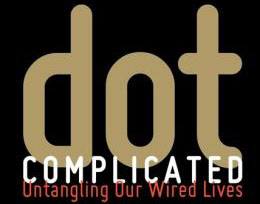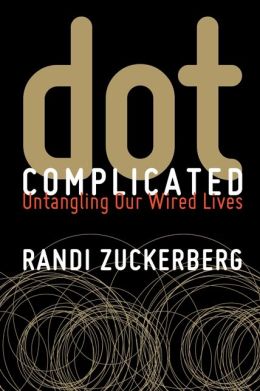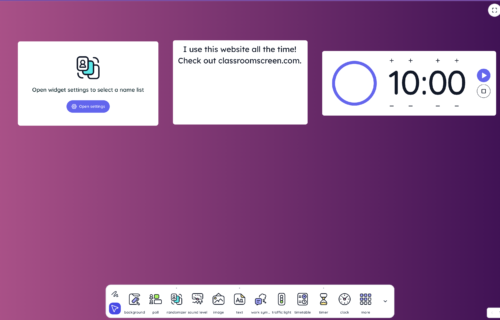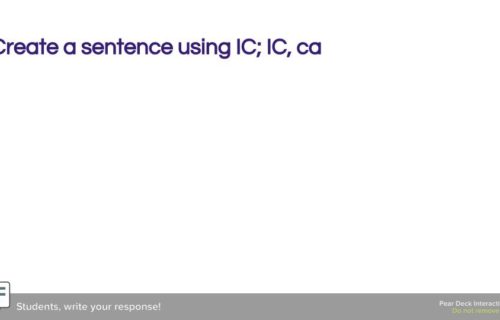
Dot Complicated: a book review
I just finished reading Dot Complicated: Untangling Our Wired Lives by Randi Zuckerberg, sister to Facebook founder Mark Zuckerberg. In this book, she tackles the subject of how evolving technologies complicate people’s lives.
 Zuckerberg’s book mixes biography, advice, and history to provide a unique perspective on evolving technologies and people’s need to find balance. She tackles a range of topics that have been changed by technology, including love and relationships, politics, and work and career.
Zuckerberg’s book mixes biography, advice, and history to provide a unique perspective on evolving technologies and people’s need to find balance. She tackles a range of topics that have been changed by technology, including love and relationships, politics, and work and career.
What is fascinating is that even though Zuckerberg’s career and fame are inextricably tied to technology, she has a fairly conservative approach when it comes to using it personally and works hard to find that “balance”.
I read this book hoping to gleam some research for a paper that I am writing about the role of evolving technologies and Ignatian pedagogy and spirituality, and while many parts weren’t applicable for my paper, Zuckerberg makes some interesting points about how much of our lives have changed because of the use of technology, specifically social social media.
Her book shows that the need to find balance with evolving technologies is a mainstream issue that is affecting everyone—those of us who are “tech savvy” and those of us who are just learning how to use these evolving technologies. A particularly interesting part of her book centered on the use of Smartphones and how much they have changed our lives and shares research to support that our need to check-in with a virtual world can be as addictive as drug use.
She writes: “Our phones are demanding more and more of our time, and we’re giving in. But we’re not entirely to blame for this phenomenon. Studies have shown that checking your smartphone can be as addictive as using drugs. According to Dr. Peter Whybrow, a psychiatrist who runs the Semel Institute for Neuroscience and Human Behavior at UCLA, the smartphone is even a kind of ‘electronic cocaine.’ Because our brains are wired to seek out novelty as a reward, all those constant updates and notifications you receive from your friends basically give you a little hit every time you tap ‘refresh.’ As Dr. Whybrow said, ‘With technology, novelty is the reward. You essentially become addicted to novelty.’ When someone ‘likes’ something you do, your brain receives a little burst of dopamine, a chemical that the brain produces to indicate a reward. That’s what makes our gadgets so addictive. Every time we get a notification, we’re hoping for another hit. This is why during dinner, when the phone buzzes, we have to resist the urge to look at the screen, at least until our dining companion goes to the bathroom and is just out of sight. Or we find ourselves Instagramming our meals instead of just insta-eating the food and liking it the natural way. Sometimes it seems that brunch will never be enjoyed again without someone first hashtagging the hash browns.”
This book would definitely be a good read for a faculty to help them get in touch with some of the issues that their students and parents are facing in today’s techy world. While we want our students to use technology and need to integrate technology to help our students become 21st century learners, we’re also called to the task of helping them learn how to “untangle” and disconnect from technology. Zuckerberg reminds her readers to be present in the moment, to find balance, to unplug; this is also important for us educators.
Zuckerberg’s book is peppered with nuggets of advice. A main theme is this: “You need control over your devices instead of letting them control you. Technology is a tool, and whether it creates order or chaos in your life depends on how you use it. The technology itself is neutral. It’s up to you to use it in a way that enhances your life and doesn’t detract from it,” she writes.
This book could also be an important read for high school or college technology classes and could open the door to many important conversations about how technology penetrates so many areas of our daily lives.
Zuckerberg has a website that helps people who want to continue to find this balance with technology: http://dotcomplicated.co/content/2013/01/welcome-to-dot-complicated/. She’s even created a children’s book, Dot, that covers similar themes for a younger audience. Look for a review of that in the future.




Add A Comment